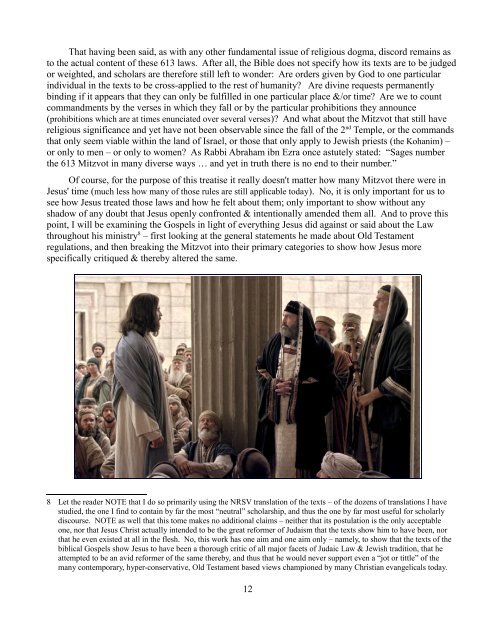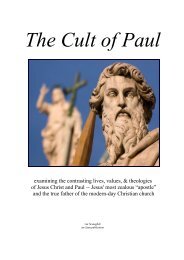Jesus Christ - a most Holy Heretic
An illuminating (and biblically exhaustive) examination of the little-known truth that Jesus Christ was not so much a supporter of the Old Testament laws of his day as he was a radically thorough reformer thereof
An illuminating (and biblically exhaustive) examination of the little-known truth that Jesus Christ was not so much a supporter of the Old Testament laws of his day as he was a radically thorough reformer thereof
Create successful ePaper yourself
Turn your PDF publications into a flip-book with our unique Google optimized e-Paper software.
That having been said, as with any other fundamental issue of religious dogma, discord remains as<br />
to the actual content of these 613 laws. After all, the Bible does not specify how its texts are to be judged<br />
or weighted, and scholars are therefore still left to wonder: Are orders given by God to one particular<br />
individual in the texts to be cross-applied to the rest of humanity? Are divine requests permanently<br />
binding if it appears that they can only be fulfilled in one particular place &/or time? Are we to count<br />
commandments by the verses in which they fall or by the particular prohibitions they announce<br />
(prohibitions which are at times enunciated over several verses)? And what about the Mitzvot that still have<br />
religious significance and yet have not been observable since the fall of the 2 nd Temple, or the commands<br />
that only seem viable within the land of Israel, or those that only apply to Jewish priests (the Kohanim) –<br />
or only to men – or only to women? As Rabbi Abraham ibn Ezra once astutely stated: “Sages number<br />
the 613 Mitzvot in many diverse ways … and yet in truth there is no end to their number.”<br />
Of course, for the purpose of this treatise it really doesn't matter how many Mitzvot there were in<br />
<strong>Jesus</strong>' time (much less how many of those rules are still applicable today). No, it is only important for us to<br />
see how <strong>Jesus</strong> treated those laws and how he felt about them; only important to show without any<br />
shadow of any doubt that <strong>Jesus</strong> openly confronted & intentionally amended them all. And to prove this<br />
point, I will be examining the Gospels in light of everything <strong>Jesus</strong> did against or said about the Law<br />
throughout his ministry 8 – first looking at the general statements he made about Old Testament<br />
regulations, and then breaking the Mitzvot into their primary categories to show how <strong>Jesus</strong> more<br />
specifically critiqued & thereby altered the same.<br />
8 Let the reader NOTE that I do so primarily using the NRSV translation of the texts – of the dozens of translations I have<br />
studied, the one I find to contain by far the <strong>most</strong> “neutral” scholarship, and thus the one by far <strong>most</strong> useful for scholarly<br />
discourse. NOTE as well that this tome makes no additional claims – neither that its postulation is the only acceptable<br />
one, nor that <strong>Jesus</strong> <strong>Christ</strong> actually intended to be the great reformer of Judaism that the texts show him to have been, nor<br />
that he even existed at all in the flesh. No, this work has one aim and one aim only – namely, to show that the texts of the<br />
biblical Gospels show <strong>Jesus</strong> to have been a thorough critic of all major facets of Judaic Law & Jewish tradition, that he<br />
attempted to be an avid reformer of the same thereby, and thus that he would never support even a “jot or tittle” of the<br />
many contemporary, hyper-conservative, Old Testament based views championed by many <strong>Christ</strong>ian evangelicals today.<br />
12

















